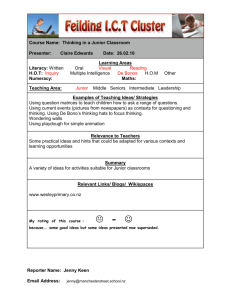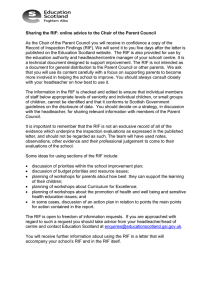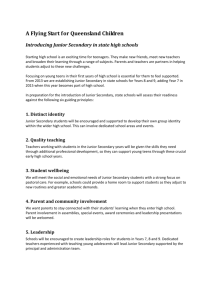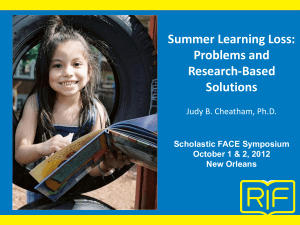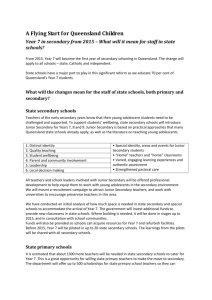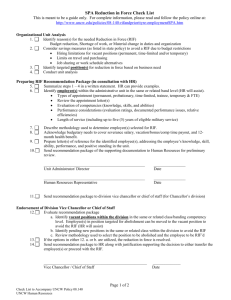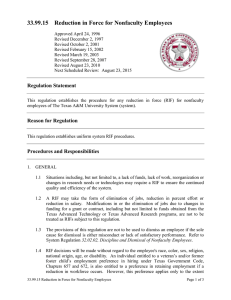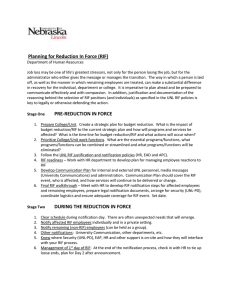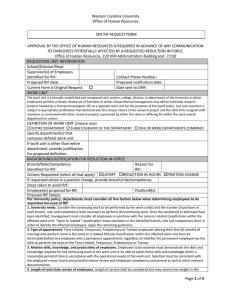Educational Support for Children in Amasaman in the
advertisement
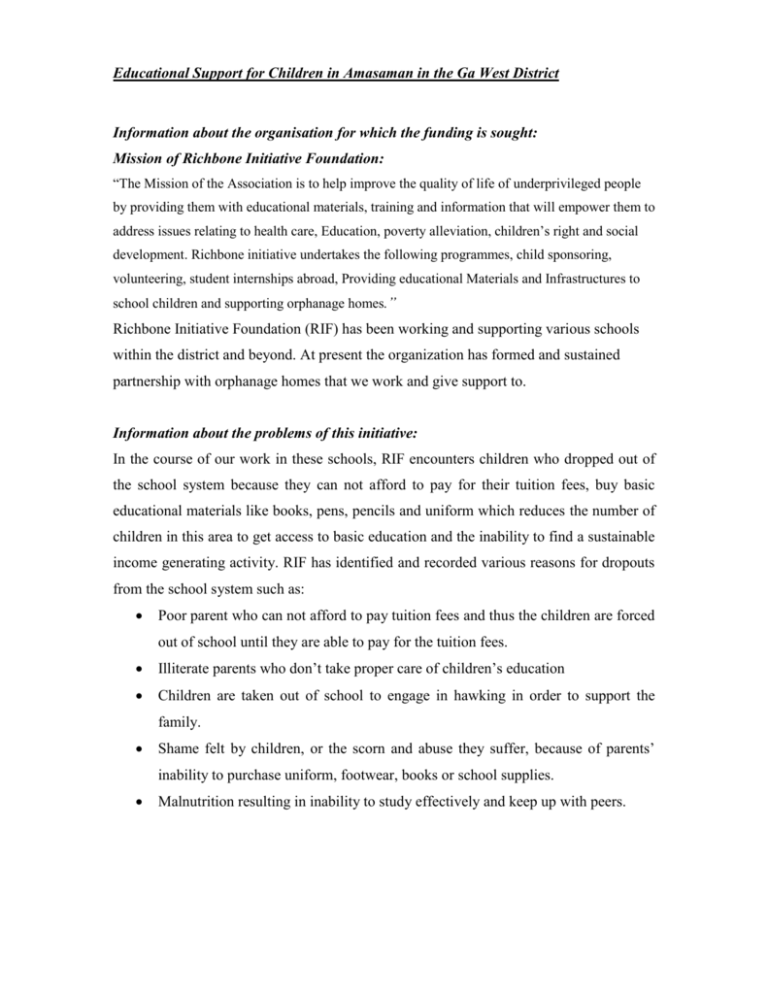
Educational Support for Children in Amasaman in the Ga West District Information about the organisation for which the funding is sought: Mission of Richbone Initiative Foundation: “The Mission of the Association is to help improve the quality of life of underprivileged people by providing them with educational materials, training and information that will empower them to address issues relating to health care, Education, poverty alleviation, children’s right and social development. Richbone initiative undertakes the following programmes, child sponsoring, volunteering, student internships abroad, Providing educational Materials and Infrastructures to school children and supporting orphanage homes.” Richbone Initiative Foundation (RIF) has been working and supporting various schools within the district and beyond. At present the organization has formed and sustained partnership with orphanage homes that we work and give support to. Information about the problems of this initiative: In the course of our work in these schools, RIF encounters children who dropped out of the school system because they can not afford to pay for their tuition fees, buy basic educational materials like books, pens, pencils and uniform which reduces the number of children in this area to get access to basic education and the inability to find a sustainable income generating activity. RIF has identified and recorded various reasons for dropouts from the school system such as: Poor parent who can not afford to pay tuition fees and thus the children are forced out of school until they are able to pay for the tuition fees. Illiterate parents who don’t take proper care of children’s education Children are taken out of school to engage in hawking in order to support the family. Shame felt by children, or the scorn and abuse they suffer, because of parents’ inability to purchase uniform, footwear, books or school supplies. Malnutrition resulting in inability to study effectively and keep up with peers. Some of the children reached in this community are malnourished and suffering from various ailments, majority of them are struggling to purchase uniforms, footwear, notebooks and other school supplies. We have found out that these “drop out” children are predominantly the children of poor parents. Most children drop out in junior high school because most often parents are no longer able to afford to keep them in school. The child is crucially deprived of the chance for a proper education while the family’s economic problems, and the cycle of poverty continue. These children who are more vulnerable to dropping out require bursary support to sustain and continue their education. RIF considers the quality of education and finds it very important to children and when these children drop out and fail to continue within the existing school system they might end up usually becoming unskilled labourers or without any skill. RIF intends to successfully develop the educational standard of these children by helping them continue their education through junior high school. We believe that the situation is too big for us to provide support for the payment of tuition fees and provision of educational materials for these children, to sustain and improve their education. Proposed start date and duration: Start: First term of the 2012/2013 Academic year which begins from January 2012. Duration: A period of three years following which, a commitment will be made to support youngsters through their remaining Secondary education, technical training or vocational training institute. Beneficiaries: Children from the poorest families in this community, whose education is at risk of ending prematurely through the force of family poverty. These families, identified by Tutors of the various schools in the community, will be invited to make an application on behalf of their child, generally through the Tutor. Aims and objectives: To enable these children to achieve their educational potential by providing: Bursary support during their Junior High education. Provision of education materials such as books, pens, pencils and uniforms. Career guidance, so they make an informed choice for an appropriate continuation of their education. Activities: Appointment of a staff member from existing experienced staff members of the organization for the programme coordination. Identification and selection of 30 children from these schools All selected children will be required to attend school regularly Collection of data on their families like income, occupation of parents, level of academic performance etc. Pre and post orientation will be given to parents and children in this scheme Staff will monitor the students in their schools for their attendance and academic performance at least twice a month. Periodic, e.g. monthly meeting with parents and children will be conducted about the bursary support and motivation. Prepare a description of the scheme (to be given orally or in writing) to the identified families to make an application for their child. It is planned that this will include a summary of the parent’s obligations and the children’s rights. Expected outcome: All the selected students will successfully complete their education period with improved record and will be admitted into higher level after completion. All the students passing the junior high will be career counselled and prepared for appropriate continuation of their education through well informed choice. Reducing the drop out ate in this community. Selection Criteria for Children: Children to be included in this programme will be identified through tutors in the various schools. In choosing children for the programme, the following will be taken into account: 20 out of 30 would be female children. Eagerness to learn on the part of the child Enthusiasm of the parents in relation to follow up of commitment to allow the children to go to school Children about to enter the Junior High School Monitoring and evaluation: The appointed staff will monitor the children in the schools directly, by interaction with the students’ tutors at these schools and by monthly visits to their homes, reviewing their attendance and improvement in learning. Subsequently they will discuss their progress with teachers and parents. The staff will be directly reporting to the Project coordinator and the coordinator will monitor the staff in terms of his/her performance, creativity, problem identification and solving and initiative taking. A midterm evaluation will be conducted after six months. Documentation and reporting: The staff will maintain a register of children with their personal, family, social, educational and economic status with their photographs. Staff will prepare a monthly report and submit to the Project Coordinator for a final report. Identification of possible problems: Though we are well planned and organised, we anticipate and will be prepared to face some problems such as: Some local opinion leaders may insist us to include some children who do not fall in our criteria. Some school teachers may not cooperate to give special attention to the selected children. Some parents may lose enthusiasm. The Total amount needed to pay tuition fees and provide educational materials for these children would be $15,500.
